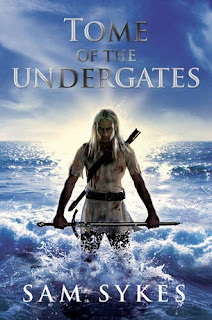Since it’s that time of year, I thought I’d do a few Best Of posts. The first one is about writers I discovered this year for the first time and really enjoyed. Given my years away from genre reading, a lot of these people are far from new, but here goes anyway, because if you don’t know who they are, you should:
Mike Resnick: I have read more books by him than any SF writer except Orson Scott Card at this point. His writing style is simple like my own without the hard SF. Instead he has great plots and characters in exotic settings like Africa or Africa inspired planets. Just really good solid story telling and craft, and to top it off, not only did I discover his stuff but we became friends this year. He’s been a real help and encouragement to me, and I’m grateful.
Jay Lake: I discovered Jay through Ken Scholes, whom I discovered in 2009 when I found “Lamentation” and loved it so much I bought “Canticle” and read it straight after. Ken is amazing and Ken and Jay are like brothers. Different yet connected at the hip. Jay and I have argued a lot over politics and some over religion. But Jay has been gracious to me and encouraging in my work and life. He’s been inspiring as well because he’s my age and yet he’s fighting cancer with a passion and dignity I don’t know if I could muster under similar circumstances. He’s a heck of a nice guy and if things work out, he’ll be my instructor at Cascade Writers in 2011. His Clockwork Earth series (Mainspring, Escapement, Pinion) introduced me to Steampunk and made me a fan. And his “The Death of A Starship” novella and short stories have awed me as well.
Nnedi Okorafor: I have her novel “Who Fears Death” sitting beside my bed waiting to be read. I’ve only read a short story by her but her conversations with me on Twitter have been deep. She’s passionate, kind, and very, very smart. She’s deep and well worth investing time in as a person, so I know she’ll be worth all of our time as a writer.
Brenda Cooper: Her story “Robot Girl” in Analog last April blew my mind and made me a fan. I have one of her novels here waiting to be read as well, but I’ve read several of her short stories and also spent time chatting with her at World Fantasy and on Twitter and she’s one admirable lady. Also deep and well worth the time.
Blake Charlton: Dyslexic med student and fantasy author and an awesome guy. “Spellwright” held me spellbound, a great read, and I can’t wait to read “Spellbound” and anything else he comes up with. Blake was one of my early Twitter friends and we finally got to hang out in person at World Fantasy. A nice guy, very smart, perceptive, and the first pro to help me out by giving feedback on a section of my novel. It was quite helpful and much appreciated. He’s a great conversationalist with a great sense of humor. Highly recommended.
James K. Burk: His debut novel “The Twelve” is some of the best character and world building in anything I’ve read all year (and I read Song of Ice And Fire this year by the way), so I recommend checking him out. Previously he had several shorts published. I look forward to more from him in the future. He also gave very useful feedback on my novel at the ConQuest 41 Writer’s Workshop and he’s a good friend.
Sam Sykes:Sam’s “Tome Of The Undergates” was the first sword & sorcery I’d read in years and I’m hooked again. Have a whole stack yet to read of the stuff. I can’t wait to read his follow up, “Black Halo,” either. Sam wrote one of the grittiest books I read all year and also one of the most honest, and he also wrote the longest battle scene I’ve ever read. He’s a nice guy and very perceptive and active on Twitter. He was also my first guest on Science Fiction Fantasy Writer’s Chat on Twitter so I owe him props forever.
Wendy Wagner: Another Twitter friend, nonetheless, her stories in several anthologies have been very impressive, but none more than “The Secret Of Calling Rabbits” from John Joseph Adam’s “The Way Of The Wizard.” I can’t wait to read her novel next year, and I’m proud as heck of her for beating me into SFWA membership. As one who for whatever reason has read more male than female writers, Wendy has me looking at women writers with new eyes.
Christie Yant: Christie is another Twitter friend who has also set me on a path of respect for women writers. Her story “The Magician & The Maid & Other Stories” from “Way Of The Wizard” is coming in Rich Horton’s Annual Best Of next year. She gave some very insightful and thoughtful notes on one of my stories and has been a great resource for me and connected me with a lot of people. A truly talented writer and I look forward to her future output as well.
These 9 are my best and favorite new discoveries this year amongst specfic writers for reasons listed above. Who have you discovered this year?

